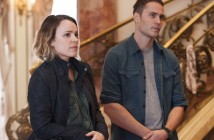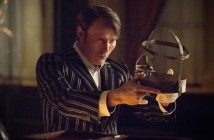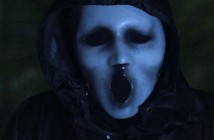July 9, 2015, 10:00 p.m. (EST), NBC
There are endings in this life we will never be fully prepared for. Some of them are as permanent as they come, others are choices we make or have made for us. To a certain extent, we are never full prepared for any ending. We are trained to believe in states of permanence, lead to believe we will be able to sustain whatever we have before us virtually forever, as far as we can even understand that idea. But it’s a lie we tell ourselves to help us sleep better at night. There is no endless tomorrow, just a finite series of days, one of which will be the last for everything you know. Relationships will end. People will die. Someday you will too. There’s no level of knowledge at which this can fully be grasped; everything about our society and psychology is structured around denying this fact. There’s an end, and it’s coming. Whether we like it or not.
At bottom, this opening stretch of Hannibal season three is about a breakup. Will and Hannibal have something that transcends any descriptions, a connection that, while not explicitly romantic, is intimate on a level few relationships ever achieve. Yet their coupling is also toxic, a beautiful union that writs ugliness across the world, an understanding that requires each to embrace only the darkness in the other. In short, it’s a bad relationship, one that Will was right to try to break free of. Yet Will, the most insightful non-Lecter character on this show, understands that he is still and will forever be drawn to Hannibal, tempted by what he can offer. It isn’t that he doesn’t love his friend; it’s just that he understands that love is tainted.
“Dolce” doesn’t work as an episode of television, not entirely in the way it is clearly intended to. The problems I highlighted in discussing “Contorno” still exist, and the plotting of this episode is rushed to the point that it is literally nonsensical. Chiyo shoots Will for reasons that are muddled at best. Somehow, Will’s life is saved and he and Hannibal end up in the custody of Mason Verger (what happens to Jack is completely unknown). That ending is less of a twist or a cliffhanger than a cheat—the narrative jumps in a way that is totally unearned to get us closer to the place we were bound to end up. The narrative is coming apart in “Dolce,” the plot foundation of this season failing to cohere in anything like a rational way. The world doesn’t make the sense it used to. Partially, this is a failing on behalf of the show, which has embraced its esoteric and ponderous tendencies and given its storytelling short shrift in favor of gesturing artfully at greater meaning. But partially, I am willing to entertain the notion that this season is after something much greater, after the idea of what it looks like when the world around you stops making sense, when the person who made you whole is torn away, by your hand or by the hand of another. This is what it feels like when your heart breaks.
For all that this season’s plotting continues to be frustrating, there are plenty of pleasures that offer redemption for “Dolce.” For one thing, it’s breathtaking, from the opening sequence that watches Hannibal lick his wounds to the marvelous coupling of Alana and Margot which, while wholly unearned textually, still bristles with sensuality and ultimately comes to make a sort of intuitive sense. That’s the logic this season operates on. Things do not follow in the way we are accustomed to, but pulse with an emotional logic totally divorced from plotting. As a kaleidoscopic sex scene, the Alana-Margot union is a thing of absolute beauty. As a plot point, it is a hard left turn that feels justified only by the stylistic showiness it allows. To harken back to something Bedelia said in the premiere, Hannibal seems to no longer have ethical concerns, only aesthetic ones.
Yet any episode that features such a powerful reunion between Hannibal and Will, that unleashes the drugged up Bedelia Du Maurier on the world, and that trades in such glorious surrealism as that sex scene or Hannibal and Will’s various moments of merging is far from irredeemable. I have often said, in recent years, that Hannibal is my favorite thing on television, and that remains true. Yet in the last few weeks, it has felt divorced from what makes it so frequently transcendent. It has chased its own tail down a rabbit hole, devoured its emotional and ethical concerns in favor of its focus on being artful. The show threatens to cease being a narrative entirely. A non-narrative Hannibal is a thing I might watch and enjoy, but it is leaving much of what makes the show great on the table. I don’t ask that this series make strict logical sense, because it has always operated on a more emotional and visceral plane than that. Hannibal works because you can feel it working, deep down in your psyche, deep down in the part of you that is fascinated by endings, even as you can’t quite believe they exist. That’s the allure of darkness. That’s the romanticism of the macabre. Everyone has a death wish, because no one really believes that wishes can come true. We all want to dance as close as possible to the void because we are confident we’ll be able to pull ourselves back at the last second, with the wisdom we’ve gained from peering over the edge. That’s what this season of Hannibal is doing at the moment. But it risks falling prey to that same fallacy, the one writ all too real by the show’s cancellation and by its bleak prospects for revival. This is a stretch of episodes made by a show that seems to think it will live forever. We want to believe it too. But we all know that it won’t, even if we can’t quite convince ourselves. Everything ends. Which makes every moment before that ending all that much more precious. Here’s hoping Hannibal intends to waste no more.
The Roundup
- “You had him here, Jack. He was beaten. Why didn’t you kill him?” “Maybe I need you to.”
- “I see my end in my beginning.” “All of our ends can be found in our beginnings. History repeats itself. And there is no escape.”
- “You may make a meal of me yet, Hannibal. But not today.”
- “He puts us in cages to see what we’ll do.” “Fly away or dash ourselves dead against the bars.”
- “I don’t believe you.”
- “If I saw you every day forever, Will, I would remember this time.”
- “I’m wondering if either of us can survive separation.” “Now is the hardest test. Not letting rage or frustration, or forgiveness, keep you from thinking.”
- “Does God gloat?” “Often.”
- “What’s for dinner?” “Never ask. It spoils the surprise.”
- “I would’ve liked to show you Florence, Will.”
For all that this season’s plotting continues to be frustrating, there are plenty of pleasures that offer redemption for “Dolce.”
-
GOOD




